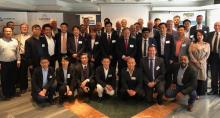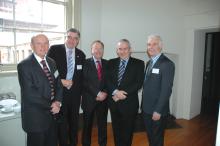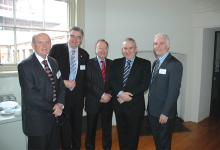Launched in 2010, GAIN (the Global Aggregates Information Network) is a voluntary network of the major regional aggregates associations of the world. Its mission is to openly share experiences and industry best practices, while also promoting greater sustainability and performance within the global aggregates industry. Below, Jim O’Brien, former UEPG president, now honorary UEPG president, and the founder and convenor of GAIN, discusses the association’s impressive growth.
During my time as UEPG president I had a vision that the aggregates industry, despite being an essentially local industry, could share its hard-won experiences internationally and thereby enhance its performance globally. Deliberating with international colleagues, it was decided to give this new network the title of the Global Aggregates Information Network, which also gave the very appropriate acronym of GAIN.
The first GAIN meeting in 2010 in Brussels, Belgium, hosted by UEPG, comprised only five regions, Australia, Brazil, Colombia, USA and Europe, but it opened the doors for an unprecedented level of friendly international exchanges. By the next meeting in Charlotte, North Carolina, hosted by NSSGA, the enthusiastic participation grew to include Canada, China and New Zealand. The enthusiasm continued to grow through the third meeting in Brussels and fourth in Cape Town, hosted by UEPG and ASPASA respectively, by then adding South Africa.
The Fifth GAIN Meeting in 2018 made a new record by including participation from Argentina, Australia, Brazil, Canada, China, Colombia, Japan, Latin America, New Zealand, South Africa, USA and Europe. It is hoped to encompass even more new GAIN members in the next meeting scheduled to take place in Argentina in 2020.
Within GAIN, UEPG represents all of Europe, essentially EU and EFTA countries, where the association started.
From North America, NSSGA represents the United States, while Canada is currently represented by three provincial associations, OSSGA, ASGA and BCSSGA, from Ontario, Alberta and British Columbia respectively. Mexico, represented by ASEC, has just joined GAIN.
In South America, Argentina is represented by two state associations, namely CEMINCOR and Cámara de la Piedra, which are united under the national association of Federación Argentina de la Piedra. Brazil is represented by ANEPAC, while Colombia is represented by ASOGRAVAS. Chile is represented by the company ARENEX, pending the formation of an association.
From the Middle East, the United Arab Emirates is represented by Stevin Rock (as no national association exists there), which has just recently joined GAIN. From Africa, the only GAIN member so far is ASPASA, representing South Africa.
From Asia, the China Aggregates Association (CAA) strongly represents the largest and rapidly modernising aggregates industry globally. India has just recently joined GAIN, represented both by the Aggregates Manufacturers’ Association (AMA) and the Mining Engineers’ Association of India (MEAI). Japan is represented by its Crushed Stone Association (JCSA). Malaysia has recently joined GAIN, represented by the Malaysia Quarries Association.
From Oceania, Australia is represented by the CCAA, and New Zealand is represented by its AQA.
All these GAIN member countries together represent 70% of the global aggregates production of 50 billion tonnes, produced in around 500,000 quarries and pits worldwide, estimated to employ up to four million people. The aggregates sector is by far the largest extractive industry globally in terms of its numbers of sites, production tonnages and people employed. Aggregates are the most consumed bulk product on the planet – over six tonnes/person/year.
The key characteristic of GAIN is the palpable enthusiasm in sharing experiences and best practices between all its members. For that reason, a GAIN website has been set up at www.GAIN.ie and every six months or so a newsletter is prepared to promote ongoing GAIN communications, the latest being downloadable from the website. Several major national conferences are held each year, the most recent by the CAA in Shanghai, which several GAIN members attended. It is planned that GAIN membership and best-practice exchange activities will further develop in 2019.
In future editions of Aggregates Business magazine, I will be looking at how GAIN and its members are having a positive impact on the sustainability of aggregates production, while also helping to tackle key challenges and strategically shape the future global aggregates industry.
This article first appeared on our sister title Aggregates Business.








